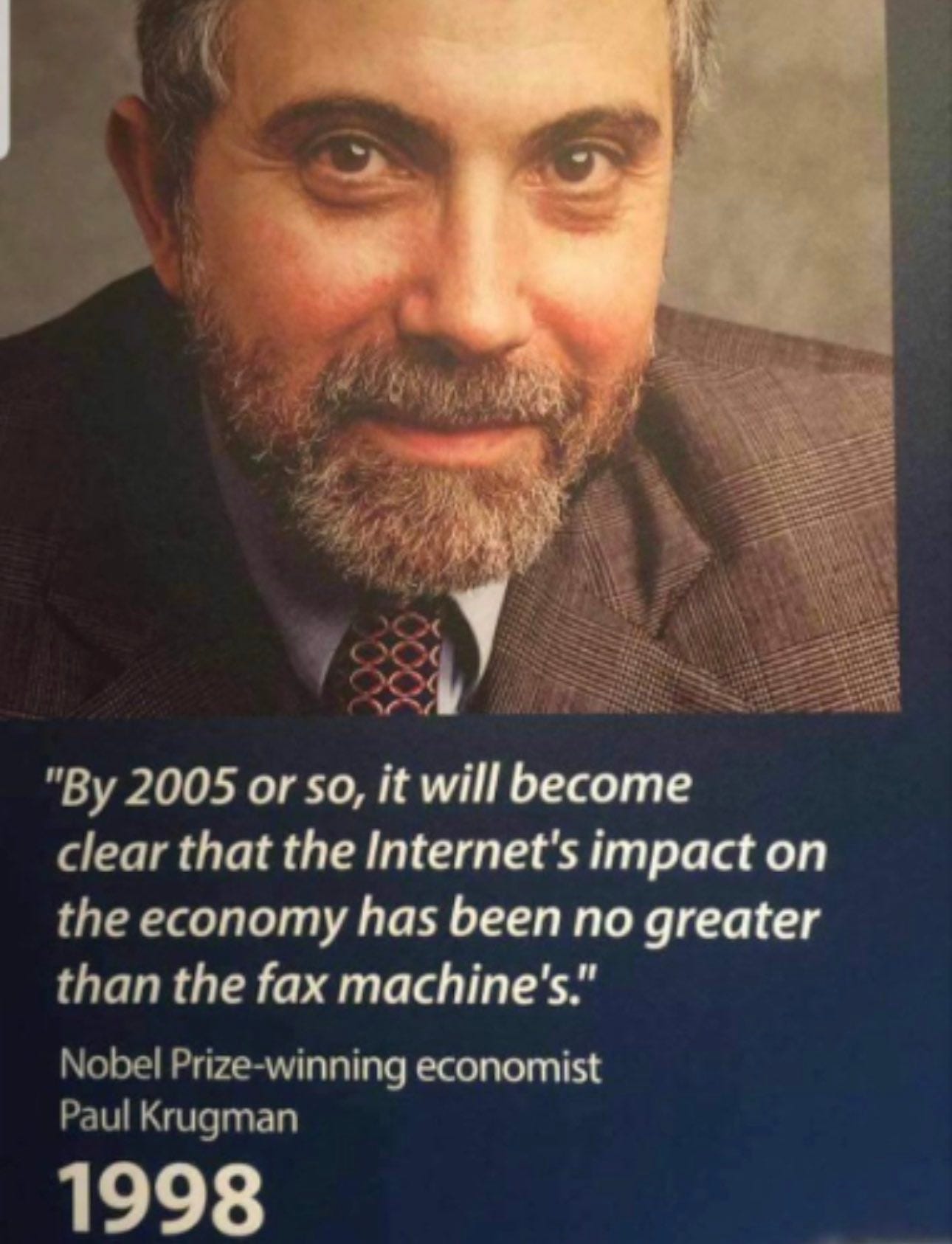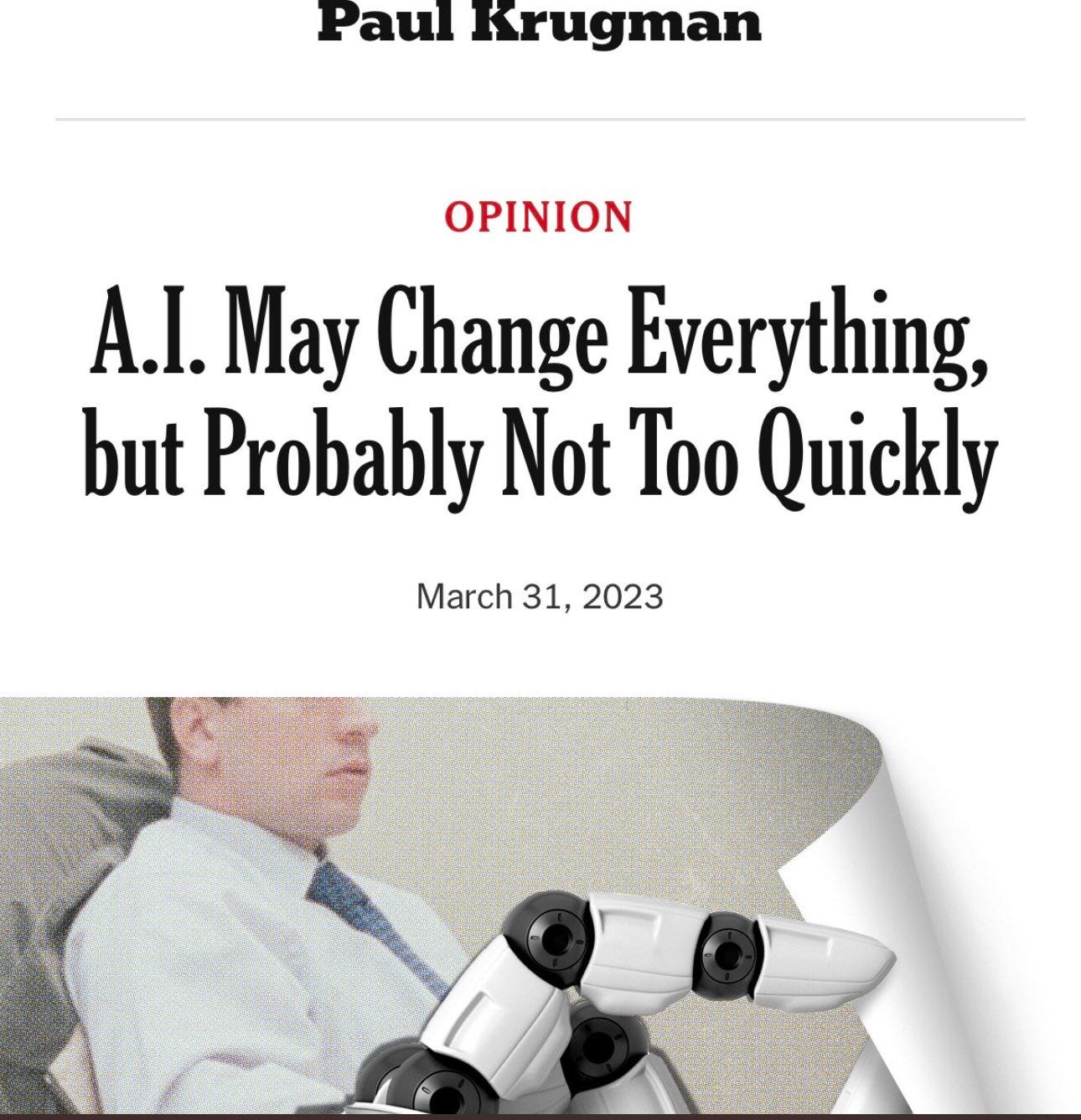Bet on nothing changing and you will be right until you are wrong
Why Mark Ritson is wrong this time
Mark Ritson is one of my favorite marketing pundits. He mostly argues, as I do, that when marketer mess up it is mostly because they forget the basics and got distracted by the new shiny things. He is contrarian and curmudgeonry, two characteristics I both appreciate and enjoy. But in his column last week on artificial intelligence, he is very very wrong.
He argues that AI, like big data, machine learning, consumer personas, distributed ledgers, and all the other hyped trends of the last two decades, is a distraction from getting the basics right. He believes the only reason to “do AI” is if you can use it to ride a wave of increasing awareness. He doesn’t think AI will make your business better, but by talking about AI be believes you may be able to increase the salience of your brand (thinking like a marketer!). He ends his essay talking about Microsoft and how AI has allowed the company to get people talking about their Bing search engine for the first time since it launched 15-years ago. He wraps up his essay with a bang:
The new presence of AI and the subsequent PR is enough to drive a shit-tonne of salience for Bing. In many cases, it might just be enough to drive a significant proportion of the market to switch search engines. And at that point, if you buy into AI and ChatGPT and the whole narrative of machine learning, you will perceive that your results are superior because of your prior beliefs. Similarly, when you next struggle to find your favourite trumpet or underwear or lounge singer on Google, it’s possible that all the BS about AI tempts you into thinking that Bing might do a better job, and 30 seconds later you’ve switched sides.
In a great moment of irony, the biggest and most immediate implication of computer-based AI is that it plays to one of the oldest, most human, most subjective facets of consumer decision making. Maybe I am a believer after all.
Mark basically argues that this “new AI thing” is all sizzle and no steak. His advice is that marketers should not be distracted with the sizzle, unless they can use it to distract their customers (or the media) somehow.
This is the right stance to go into any new tech trend. I have multiple chapters in my upcoming book about how marketers need to stop wasting their time chasing the latest trends, when they are neglecting to do things like answer the phone when their customers call. But when I was doing my most recent edit of the book I had to make some changes. One the the trends I mocked marketers for wasting time on was “AI”. I wrote that in the books first draft back in 2018. It remained true for every revision, until summer 2022. Sometimes, rarely, the new thing is something you SHOULD be paying attention to.
The biggest thing since the internet
In 1998 Paul Krugman said “By 2005 or so, it will become clear that the Internet’s impact on the economy has been no greater than the fax machine’s”.
Better against the new thing to change everything is a good bet! Almost always. If you always made that bet you would get almost all your bets right.
But you would be wrong about personal computers, the internet, and smart phones (to name three bigs ones from my lifetime. Going back further you would have missed things like nuclear power, airplanes, automobiles, the assembly line, the steam engine, the printing press, and “America”).
Being wrong three times in a lifetime isn’t bad. So maybe that is why Krugman is sticking with his strategy:
Bryan Caplan has a history of making public bets on the future (and winning). Most of his bets follow Krugman’s strategy of assuming things will not change very much. On January 19th, 2023 he bet that by January 30, 2029, the best AI models would not be able to get (almost) straight “As” on Bryan’s own economics exam. As Bryan wrote at the time:
ChatGPT got a D on my last labor economics midterm. You could respond, “AI is overrated now, but amazing results are coming soon,” but I’m skeptical. I take base rates very seriously, and the base rate for new techs grossly overpromising and underdelivering is at least 95%. Kahneman’s maxim that “Nothing is as important as you think it is, while you’re thinking about it” is relevant as well. To my eyes, AI fandom looks more like a mass hysteria than a sensible reaction. While AI could be the exception that proves the rules, I doubt it.
I reached out to Bryan to see if he would double down on the bet (I told him I would go as high at $10,000). He was willing to do another $500, but we did not finish locking down the details (totally my fault for not being faster in my correspondence) before he changed his mind about making more bets. On March 21st GPT-4 took Bryan’s test and scored the 4th highest in the class.
Byran, and Krugman, and Ritson (and me!) are right that, almost all the time, the right bet is that nothing much is going to change.
If you bet that way every time you will almost always be right, and you can look down your nose at all the hysterics who are convinced the next thing is going to change everything.
The people claiming that “now everything will be different” are almost always wrong.
Until they aren’t.
I sometimes feel bad about how much this marketing newsletter talks about AI. Last week I went out of my way to include three posts about more traditional marketing issues. But I think that was a mistake. The most important thing happening in marketing right now is AI and how smart CMOs will best use the new capabilities. There are a lot of newsletters writing about the latest AI products or latest research findings (all of which are amazing!), and I cannot hope to compete with those offerings. But I think what I can do here is help translate those findings into actionable things that CMOs can be doing — at least when they aren’t head’s down getting the basics right.
Keep it simple,
Edward






"I sometimes feel bad about how much this marketing newsletter talks about AI."
I know this pain. It's interesting because for those who engage with AI, it is pretty clear to see that there is a lot of utility and insights to be gained from discussing it. But those who are not into it, it comes across as just a total fad.
I haven't covered it yet on my own marketing newsletter for this reason, but I will do at some point and mainly from the point of view of trying to explain in practical terms how to leverage these tools.
I'm not as brave as you to tackle the topic head on, even going against what of my own favourite marketers, Mark Ritson (and I see one of yours too), so you definitely deserve kudos for that.